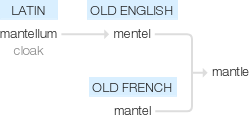Mantle
Old English mentel, from Latin mantellum ‘cloak’; reinforced in Middle English by Old French mantel .
wiktionary
From Middle English mantel, from Old English mæntel, mentel(“sleeveless cloak”), from Proto-West Germanic *mantil, from Proto-Germanic *mantilaz(“mantle”); later reinforced by Anglo-Norman mantel, from Latin mantēllum(“covering, cloak”), diminutive of mantum (French manteau, Spanish manto), probably from Gaulish *mantos, *mantalos(“trodden road”), from Proto-Celtic *mantos, *mantlos, from Proto-Indo-European *menH-(“tread, press together; crumble”).
etymonline
mantle (n.)
Old English mentel "a loose, sleeveless garment worn as an outer covering, falling in straight lines from the shoulders," from Latin mantellum "cloak" (source of Italian mantello, Old High German mantal, German Mantel, Old Norse mötull), perhaps from a Celtic source, or, if the Latin word is the same word as mantelum, mantelium "a cloth, hand-towel, napkin," perhaps it is from manus "hand."
Reinforced and altered 12c. by cognate Old French mantel "cloak, mantle; bedspread, cover" (Modern French manteau), also from the Latin source. Figurative sense "that which enshrouds, something that conceals, a covering" is from c. 1300. Allusive use for "symbol of literary authority or artistic pre-eminence" (by 1789) is from Elijah's mantle (II Kings ii.13). As a layer of the earth between the crust and core (though not originally distinguished from the core) it is attested from 1940. To take (originally have) the mantel (and the ring) was a symbolic act done before a bishop by a widow, indicating a vow of chastity (c. 1400).
mantle (v.)
early 13c., mantelen, "to wrap or cover in a mantle," from mantle (n.) or from Old French manteler, from the noun in French. The figurative sense of "to obscure or protect by covering up" is from mid-15c. Intransitive sense of "become covered with a coating" (of liquids) is from 1620s; that of "become suffused" (as with blushes or color) is by 1707. Related: Mantled; mantling.
